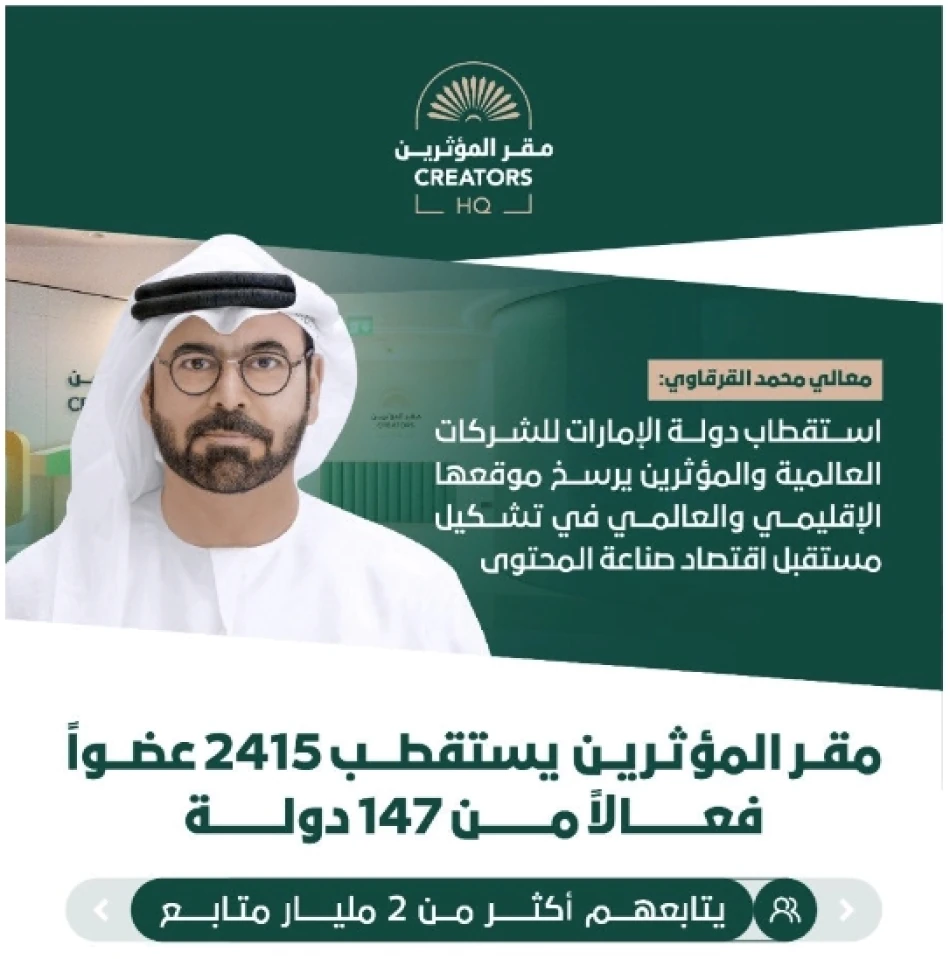
Influential Hub Attracts 2,415 Active Members from 147 Countries with Over 2 Billion Followers
UAE's Influencer Hub Attracts 2,400 Global Content Creators in Six Months, Signaling Middle East's Digital Economy Ambitions
The UAE's ambitious bid to become the global capital of content creation is gaining serious momentum. The region's first dedicated Influencer Hub has successfully attracted 2,415 active members from 147 countries within just six months of operation, while convincing 78 international companies to relocate their operations to the Emirates. This rapid adoption suggests the UAE is positioning itself as a serious competitor to established creator economy hubs like Los Angeles, London, and Singapore.
A Strategic Play for Digital Dominance
Launched in January 2024 during the third edition of the Billion Followers Summit, the Influencer Hub represents more than just a co-working space for content creators. It's a calculated move to capture a significant share of the global creator economy, which is projected to reach $480 billion by 2027 according to Goldman Sachs estimates.
The numbers tell a compelling story. The creators who have relocated to the UAE collectively command over 2.45 billion followers across various platforms, giving them substantial influence over global conversations and consumer behavior. This concentrated digital reach rivals the combined audience of traditional media outlets.
Global Migration Patterns Emerging
The geographic distribution of relocating creators reveals interesting patterns. The UK, Pakistan, the United States, India, France, and Germany lead the migration, suggesting the UAE is successfully attracting talent from both established Western markets and emerging digital economies. This mirrors similar talent movements seen when Dubai positioned itself as a regional financial hub in the 1990s and 2000s.
Economic Incentives Drive Adoption
The UAE's approach combines financial incentives with infrastructure development. The hub offers exclusive services including assistance with Golden Visa applications, relocation support, and company formation services. This comprehensive package addresses the primary friction points that typically prevent international talent from relocating.
Minister of Cabinet Affairs Mohammed Abdullah Al Gergawi emphasized that the success demonstrates the UAE's "unique advantages" in shaping the future of content creation economics. The government's backing, stemming from a directive by Dubai's ruler Sheikh Mohammed bin Rashid Al Maktoum, provides institutional weight behind the initiative.
Infrastructure Investment Signals Long-term Commitment
The facility is equipped to host over 300 events and workshops annually, indicating the UAE's commitment extends beyond simple tax incentives. This infrastructure-first approach resembles Singapore's strategy for attracting fintech companies and Ireland's successful courting of tech giants through specialized economic zones.
Market Implications and Competitive Positioning
For investors and industry observers, the UAE's rapid success in attracting content creators signals several important trends. First, the creator economy is becoming increasingly mobile, with talent willing to relocate for better business conditions. Second, government-backed initiatives can effectively compete with organic creator hubs like Los Angeles or London when they offer comprehensive support packages.
The initiative also represents a hedge against economic diversification. As oil revenues become less reliable long-term, the UAE is investing in knowledge-based industries that can generate significant export value through digital content and intellectual property.
Regional Competition Intensifying
Saudi Arabia has announced similar initiatives through its Vision 2030 program, while Qatar and Bahrain are developing their own digital economy strategies. The UAE's early mover advantage in creator economy infrastructure could prove decisive in establishing regional dominance in this sector.
Challenges and Sustainability Questions
While the initial numbers appear impressive, the true test will be whether these creators generate meaningful economic activity beyond their follower counts. The UAE must demonstrate that relocated influencers are building sustainable businesses, creating local employment, and contributing to tax revenues.
The target of attracting 10,000 influencers represents a significant scaling challenge. Maintaining service quality and community cohesion while expanding rapidly will require careful management and continued government support.
The success of the UAE's Influencer Hub reflects broader shifts in how governments view digital talent and the creator economy. By treating content creators as valuable economic assets worthy of immigration incentives, the UAE is pioneering a new model for digital economy development that other nations will likely study and potentially replicate.
Most Viewed News

 Layla Al Mansoori
Layla Al Mansoori






